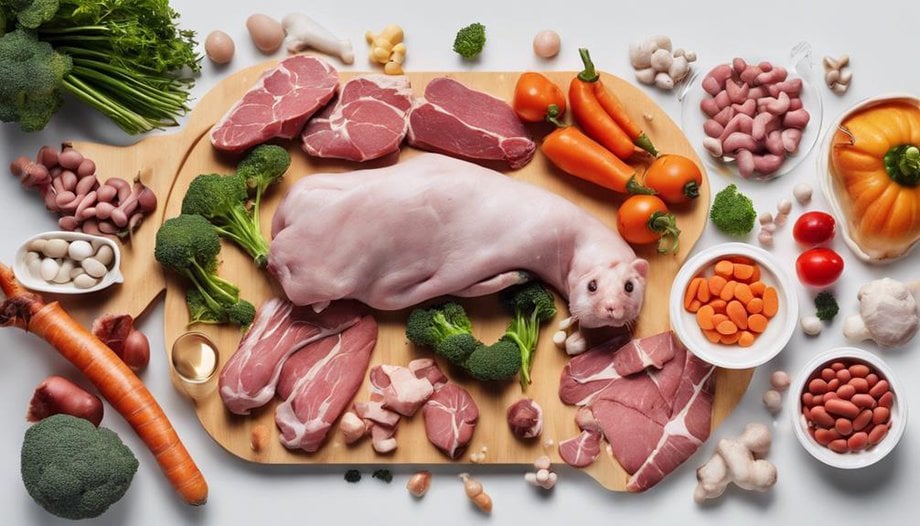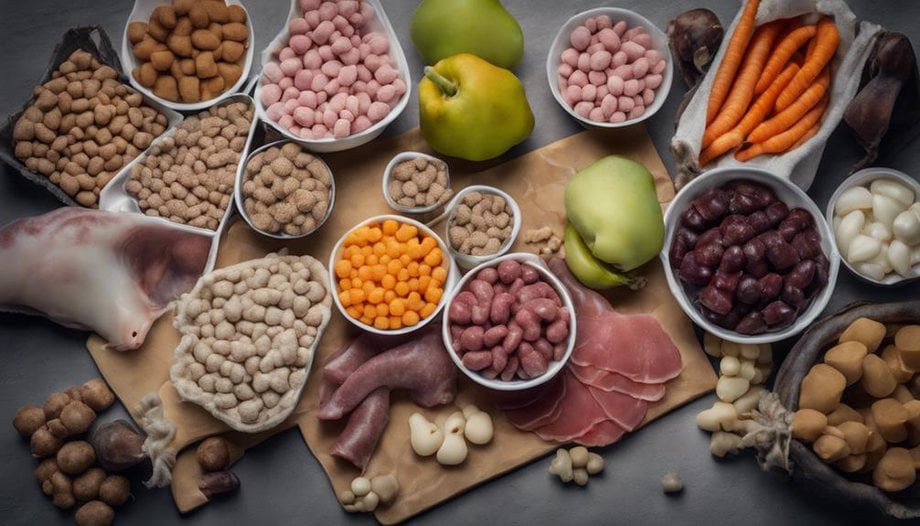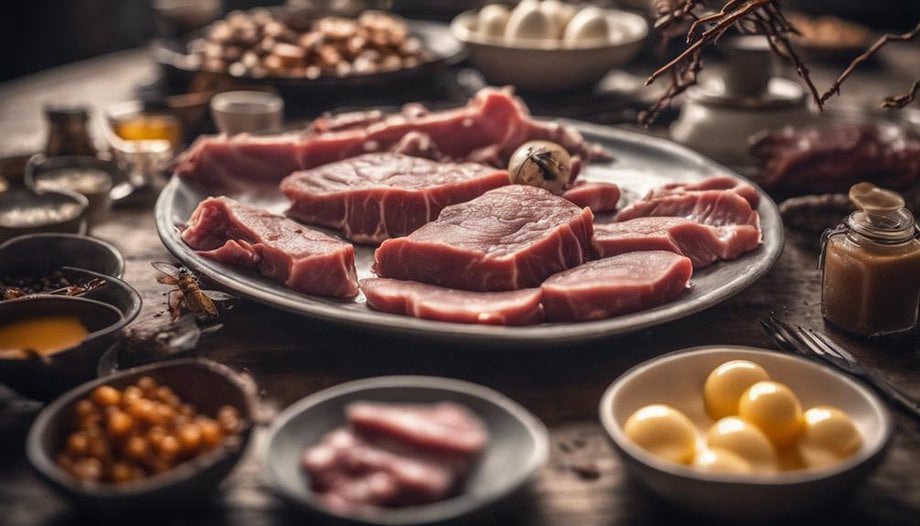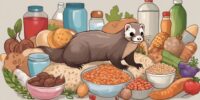How to Meet the Essential Diet Requirements of Ferrets

Ferrets are obligate carnivores, meaning they require a diet high in animal-based protein and fat. Commercial ferret diets are available in dry kibble or moist forms, with protein content ranging from 30-40%. It’s essential to feed ferrets a balanced diet to prevent health issues such as obesity, dental problems, and gastrointestinal disorders. Additionally, fresh water should always be available for hydration. Ferrets may also benefit from occasional treats of cooked eggs or small pieces of fresh meat. A well-rounded diet is crucial for the overall health and well-being of ferrets.
Understanding the nutritional needs of ferrets and providing a balanced diet will help ensure your pet’s optimal health and longevity. By offering a variety of high-quality protein sources and monitoring their intake, you can help your ferret thrive. Remember to consult with a veterinarian experienced in ferret care for specific dietary recommendations based on your pet’s age, weight, and overall health.
Understanding Ferret Nutritional Needs
Ferrets require a diet that’s high in animal protein to meet their unique nutritional needs. These obligate carnivores have a short gastrointestinal tract, adapted for a diet rich in meat-based proteins. Ferret digestion is rapid, with food passing through their system in about three to four hours. This quick digestive process highlights the importance of providing easily digestible nutrients to meet their energy requirements.
Nutritional balance is crucial for ferrets to maintain optimal health. Their diet should consist of high-quality animal-based protein, moderate fat content, and minimal carbohydrates. Due to their high metabolic rate, ferrets need diets rich in calories to sustain their energy levels. Ensuring the right balance of nutrients is vital to prevent health issues such as obesity or malnutrition.
Proper understanding of ferret digestion and nutritional requirements is essential for ferret owners to choose appropriate diets that support their pets’ well-being. Providing a diet that mirrors their natural dietary habits is key to keeping ferrets healthy and thriving.
Choosing the Right Ferret Food

Quality ferret food plays a crucial role in meeting the nutritional needs of these carnivorous animals. The food should be rich in essential nutrients like proteins and fats, reflecting the diet ferrets would consume in the wild.
Proper protein and fat levels are paramount for maintaining a healthy ferret’s energy levels and overall well-being.
Nutrient-Rich Ferret Food
Selecting a nutrient-rich ferret food involves considering the specific dietary requirements essential for optimal health and well-being. Nutrient balance is crucial to ensure that ferrets receive adequate amounts of protein, fats, vitamins, and minerals in their diet.
A well-balanced ferret food should contain high-quality animal protein as the primary ingredient to support their carnivorous nature. Additionally, focusing on a diet that promotes digestive health is vital for ferrets. Look for foods that are easily digestible and contain prebiotics to support a healthy gut flora.
Ferrets have a short digestive tract, emphasizing the need for high-quality ingredients that are easily absorbed to prevent digestive issues. Prioritizing nutrient-rich ferret food is fundamental in maintaining their overall health and vitality.
Protein and Fat Levels
To ensure optimal health for ferrets, it’s crucial to carefully consider the protein and fat levels in their diet when selecting the right ferret food. Ferrets have specific dietary requirements, with protein and fat being essential components for their well-being. When choosing ferret food, it’s important to look for high-quality sources of protein and fat to meet their nutritional needs adequately. Here are key points to keep in mind:
- Fat sources: Opt for ferret foods that contain animal-based fats like chicken fat or fish oil, as these provide the necessary omega-3 and omega-6 fatty acids crucial for a ferret’s health.
- Balanced diet: Ensure the chosen ferret food offers a balanced combination of protein and fat levels to support overall health and energy levels.
Incorporating Protein in Their Diet

Ferrets require a diet high in protein to meet their nutritional needs.
It’s crucial to consider not only the sources of protein but also the quantity and quality provided in their diet.
Understanding these aspects will help ensure that ferrets receive the necessary nutrients for optimal health and well-being.
Protein Sources for Ferrets
Incorporating high-quality protein sources in a ferret’s diet is essential for ensuring their overall health and well-being. When selecting protein sources for ferrets, it’s crucial to consider meat options that provide the necessary nutrients for their diet.
Opt for lean meats like chicken, turkey, and lamb to meet their protein requirements effectively. Including a variety of protein sources in a ferret’s diet helps maintain a balanced diet, ensuring they receive all the essential amino acids necessary for their growth and development.
Protein Quantity for Ferrets
Selecting and maintaining the appropriate quantity of high-quality protein sources is crucial for meeting the dietary needs of ferrets and ensuring their optimal health and well-being. Ferrets are obligate carnivores, meaning they require a diet rich in digestible protein to thrive.
A balanced diet for ferrets should consist of animal-based protein sources like high-quality meat products, as they provide essential amino acids necessary for their growth, muscle development, and overall health. When planning a ferret’s diet, it’s essential to consider the protein content of their food to prevent deficiencies or excesses that could lead to health issues.
Protein Quality for Ferrets
To ensure optimal health and well-being for ferrets, it’s imperative to focus on the quality of protein sources incorporated into their diet. When considering protein for ferrets, the following factors are crucial:
- Protein Digestion: Ferrets are obligate carnivores with a short digestive tract, emphasizing the need for easily digestible animal-based proteins like meat, poultry, and fish.
- Dietary Balance: Maintaining a balanced diet is essential to meet the ferret’s high protein requirements while ensuring they receive all necessary nutrients for overall health.
- Quality Sources: Opt for high-quality protein sources with a bioavailable amino acid profile to support muscle development, energy levels, and immune function in ferrets.
Monitoring Portion Sizes
Monitoring the portion sizes of food provided to ferrets is crucial for maintaining their nutritional balance and overall health. Proper portion control ensures that ferrets receive adequate nutrients without overeating, which can lead to obesity and other health issues. Establishing a feeding schedule is essential to regulate portion sizes and maintain consistency in their diet.
| Morning | Afternoon | Evening |
|---|---|---|
| High-Quality Kibble | Fresh Raw Meat | Ferret-Safe Treats |
| 1-2 tablespoons | 1-2 tablespoons | Occasional snacks |
Ferrets are obligate carnivores, meaning their diet should primarily consist of animal-based protein sources. When monitoring portion sizes, it’s important to consider the protein content of the food to meet their specific dietary requirements. Avoid feeding them foods high in carbohydrates or sugars, as these can lead to digestive issues and health problems. By carefully controlling portion sizes and following a consistent feeding schedule, ferret owners can help ensure their pets maintain optimal health and well-being.
Providing Fresh Water Daily

Maintaining proper hydration is essential for the health and well-being of ferrets, making it crucial to provide fresh water daily to ensure their hydration needs are met. Ferrets have specific requirements when it comes to water consumption and hydration levels. Here are key points to consider:
- Adequate Water Consumption: Ferrets should have access to fresh water at all times to support their metabolic functions and overall health. They typically drink between 60-100 ml of water per day, depending on factors like diet, activity level, and environmental conditions.
- Preventing Dehydration: Dehydration can be detrimental to ferrets and may lead to serious health issues. To prevent dehydration, ensure that the water bowl is placed in a secure location where the ferrets can easily access it without tipping it over. Regularly check the water level and cleanliness of the bowl to encourage drinking.
- Water Bowl Placement: Consider placing multiple water bowls in different areas of the ferret’s living space to encourage adequate water intake. This can help ensure that even if one bowl is accidentally spilled or soiled, there will always be a clean source of water available for the ferrets.
Avoiding Harmful Foods

Ferrets must be kept away from harmful foods to safeguard their health and well-being. Ensuring food safety for ferrets is crucial in preventing potential health issues. Certain foods can be harmful to these small mammals, causing digestive problems, nutritional imbalances, or even toxic reactions.
It’s important to avoid feeding ferrets foods high in sugar, as this can lead to obesity and dental issues. Additionally, foods that are high in carbohydrates should be limited, as ferrets have a short digestive tract that isn’t designed to process such foods efficiently.
Another consideration is the potential for allergic reactions. Some ferrets may be sensitive to certain ingredients, such as dairy products or grains. It’s essential to monitor your ferret for any signs of allergic reactions, such as itching, swelling, or gastrointestinal disturbances, and promptly remove the offending food from their diet.
Consulting a Veterinarian for Guidance

To ensure the optimal diet for a ferret and address any specific nutritional concerns, consulting a veterinarian with expertise in exotic pet care is highly recommended. Ferrets have unique dietary requirements, and a specialized vet can offer tailored advice to meet these needs effectively. When consulting a veterinarian for guidance on your ferret’s diet, consider the following:
- Vet Recommendations: A knowledgeable veterinarian can provide specific recommendations based on your ferret’s age, health status, and individual needs. They can help you create a well-balanced diet plan that supports your ferret’s overall health and well-being.
- Dietary Adjustments: Vets can suggest necessary adjustments to your ferret’s diet, such as increasing or decreasing certain nutrients based on their health condition. They can also advise on portion sizes and feeding frequency to ensure your ferret receives adequate nutrition without overeating.
- Nutritional Supplements and Dietary Balance: Veterinarians may recommend nutritional supplements to address any deficiencies in your ferret’s diet. They can also guide you on achieving a balanced diet that includes the right mix of proteins, fats, carbohydrates, vitamins, and minerals essential for your ferret’s health.
Frequently Asked Questions
Can Ferrets Eat Fruits and Vegetables as Part of Their Diet?
Ferrets can enjoy fruit treats occasionally. However, they do not require fruits and vegetables as a staple diet. Providing a balanced ferret-specific diet is crucial. A variety of vegetables can be offered in small amounts as occasional treats for enrichment.
How Often Should Ferrets Be Fed Throughout the Day?
Ferrets should be fed multiple small meals throughout the day to mimic their natural eating patterns. A good feeding schedule includes 2-4 meals daily. Treat options like freeze-dried meat or small amounts of fruits can be given occasionally.
Are There Any Specific Supplements That Should Be Added to a Ferret’s Diet?
When considering supplement options for a ferret’s diet, it’s crucial to maintain their nutritional balance. Experts recommend incorporating essential fatty acids, taurine, and a high-quality ferret-specific multivitamin to support their overall health and well-being.
Can Ferrets Be Fed a Homemade Diet Instead of Commercial Ferret Food?
Ferrets can be fed a homemade diet, but it must be meticulously crafted to ensure nutritional balance. Without proper expertise, dietary restrictions and nutrient absorption issues may arise. Careful consideration of homemade recipes is crucial.
How Important Is It to Adjust a Ferret’s Diet Based on Their Age or Health Conditions?
Adjusting a ferret’s diet based on age and health conditions is crucial. For optimal health, protein requirements and nutritional balance must be met. Understanding these factors can significantly impact a ferret’s well-being and longevity.











